Islamic & National Events
Category Archives:Islamic & National Events
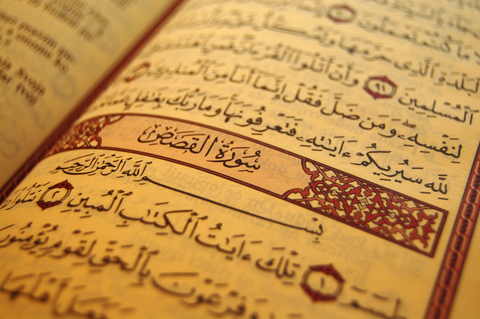
The Science of Tajweed
Tajweed is the science of recitation of the Holy Qur’an, according to specific rules which define the correct pronunciation and intonation of every letter of the Holy Qur’an.
Accuracy of recitation of the Qur’an is essential in its recitation. The Qur’an, as the direct words of Almighty Allah revealed to the Holy Prophet (peace be on him), in its written form is with us today. Accurate recitation preserves not only the meaning of the Holy book but the legacy of the Holy Prophet (peace be on him).
As Muslims, we are encouraged to recite the Holy Qur’an, and there is alot of merit in doing so – its virtues cannot be overstated, as reflected in the following ahadith:
- Recite the Quran, for it will come on the Day of Judgement as an intercessor for its companions. (Muslim)
- Brighten your homes with Salaah and the recitation of the Quran (Baihaqi)
- The best among you are those who learn the Quran and teach it. (Bukhari)
- Whoever reads a letter from the book of Allah, gets one virtue in its place; and one virtue had got ten rewards like it. I don’t say that Alif Laam Meem is a letter, but Alif is a letter, Laam is a letter and Meem is a letter (Tirmidhi)
- He who recites the Quran expertly will be with the noble scribes and he who recites the Quran and finds difficulty in pronouncing the words will have a double reward. (Bukhari and Muslim)
Tajweed is not an easy science to master, and does not lend itself easily to being self-taught. The online platform, allowing for open and ongoing access, is perhaps the best configuration available for self-study of a subject such as this. Driven by video lectures, a (free) text (included) with complete explanations, examples and exercises, the course is provided for the sole purpose of supporting anyone interested in learning Tajweed on their own time, and at their own pace.
How To Access
Access is easy.
- Visit https://maiinstitute.com/product-category/short-courses-1/
- Add the product ‘A Complete Guide to Tajweed’ to your shopping cart,
- Checkout,
- Create an account if you don’t already have one (no credit card is required), and
- Submit.
Your login credentials would be emailed to you, and you’re in.
May Almighty Allah bless your efforts.

Reading Arabic
Arabic is kind of a big deal…
Arabic is an important language. Apart from being the liturgical language for approximately 2 billion Muslims globally, it is one of six official languages of the United Nations, the official language of 26 states and a regional / minority language in several others. Arabic has an estimated 400-500 million native speakers located throughout the Middle and Near East and North Africa – the hub of global trade and travel.
For Muslims, Arabic bears special importance. It is the language of the Holy Qur’an, the book revealed through the Holy Prophet Muhammad (peace be on him) for all of humanity. The Qur’an is “a scripture whereof the verses are expounded, a Qur’an, in Arabic for people who have knowledge” (Qur’an 41:3). That the words of Almighty Allah are expressed in this language is significant, in particular from the vibrations from recitation of these words. Almighty Allah tells us “had We sent down this Qur’an on a mountain, surely, you would have seen it humble itself and cleave asunder, for fear of Allah” (Qur’an 59:21). The Holy Prophet Muhammad (peace be on him) is reported to have said, “Recitation of the Qur’an is the best divine service of my followers.”
As a language, Arabic is unique and bears a special significance in world history. The Qur’anic form and structure of language presented a new way of writing to the world, and Classical Arabic (of the Qur’an) is still widely regarded as the preferred language of poetry and literature for Arabic speakers.
But its also kind of difficult.
Arabic is often listed as a notoriously difficult language to learn. Being nested in Afroasiatic family of languages, it is different from much of the popular Indo-European languages that dominate the Western world today. The very fact that it is written from right to left is an example of this difficulty. The British Foreign Service Institute estimates one requires 2200 hours of study time to achieve general proficiency.
But there are ways to get a handle on this. The ability to read a language offers students the ability to expand and understand their grammar and vocabulary, and come to terms with different language structures. Facilitated by visual cues, reading aids in recall, and helps the student accelerate the learning and understanding once literacy skills are mastered.
The MAI Course: Learn to Read Arabic
The course ‘Learn to Read Arabic’ by the MAI Institute helps persons to along the journey of reading Arabic. Assuming no prior experience, the course takes persons from the Alphabet and phonics through vowels and other literacy principles, using words from the Qur’an as the material of practice. In this way, those seeking to learn the language are endowed with familiarity of Classical Arabic vocabulary, while those seeking to be able to read the Holy Quran would see in the exercises many words already familiar to them.
The online platform, allowing for open and ongoing access, is perhaps the best configuration available for self-study. Driven by video lectures, a (free text (included) with complete explanations, examples and exercises, the course is provided for the sole purpose of supporting anyone interested in learning to read Arabic on their own time, and at their own pace.
How To Access
Access is easy.
- Visit https://maiinstitute.com/product/arabic-001/
- Add the product to your shopping cart,
- Checkout,
- Create an account if you dont already have one (no credit card is required), and
- Submit.
Your login credentials would be emailed to you, and boom. you’re in.
Good luck and happy reading!

MAI Graduation 2019
The MAI Institute (Markaz al Ihsaan) recently held its 19th Annual Graduation Ceremony at the Markaz al Ihsaan Campus, Hermitage Village, San Fernando.
More than 100 students, family and staff were in attendance as the over 30 students graduated from the Certificate, Diploma and Aalim levels of the Islamic Studies Program offered by the MAI Institute.
This year, the ceremony had some notable differences, since in addition to the graduation, the Institute also recognized members of faculty who attained awards of merit in various capacities.
- 3 members of faculty were issued Long Service Awards for their dedication and contribution to the MAI. Mrs. Fareeda Mohammed-Rahamut; Mr. Ishmael Khan and Mr. Wazim Ohab have served for a greater part of the 19 years the institute has been active, and mostly graduated from the Islamic Studies Program before becoming members of faculty.
- In a tip of the hat to Mr. Hameez Mohammed and team, they were recognized for their award of ‘Most Outstanding Conference Paper 2019’ by the International Association of Engineers at their 2019 International Conference of Applied and Engineering Mathematics. Mr. Hameez Mohammed serves as the Head of Academic and as faculty of the MAI Institute.
- A posthumous award was issued to Imam Shuffy Mohammed for his dedication and contribution to the MAI Institute, and the media studio was named in his memory the Imam Shuffy Mohammed Multimedia Studio.
Founder and Principal of the MAI Institute, Maulana Dr. Waffie Mohammed, recognized the basis on which the Institute was founded, saying, “As Muslims one is required to become learned… to take care of himself or herself physically, morally and spiritually…. One is required to become enlightened on how to benefit from the gift of life here with the assurance of something in the Hereafter.” Dr. Waffie was a student of world-renowned scholar Dr. Fazlu Rahman Ansari (Pakistan), and is one of the oldest living persons to have studied under Dr. Ansari.
Director Mr. Faheem Mohammed located the importance of the MAI Institute in the contemporary global context. He said “Oil and Migration have dominated the agenda, and terrorists have hijacked the narrative. There is soo much more Islam has done and continues to do, but we have to remind Muslims and non-Muslims alike of this. And for this we need all capable hands on deck.”
Mr. Mohammed also recognized the MAI Institute’s efforts to build on achievements of past Islamic scholarship in various branches of study – Ibn Haytham for the scientific method; Jabir al Hayyam as the father of Chemistry; Ibn Khaldun as the founding father of the study of History and Sociology; and Hazrat Omar in Law. “The Markaz in a short space of time has been able to contribute to distinct works in such areas as Islamic Sociology, Islamic Psychology, Public Speaking, Muslims in Minority and Islamic Groups in Contemporary Society. Some of these titles are published in far off places like Malaysia, and used in universities there.”
Chairman Haji Imtiaz Edoo moved an emotional appreciation where he appealed to the graduates to make the best contribution to society with the knowledge they were able to receive. He reminded all persons that nothing lasts forever and they were in part lucky to have access to the faculty team led by Maulana Waffie, and in part responsible for what the future of the community would be.
The MAI Institute is gearing up for a year-long celebration of its 20th Anniversary, and would be hosting a range of activities catering to present and past students, members of the Muslim community as well as the greater national community.
For more information, visit https://maiinstitute.com; or email admin@maiinstitute.com
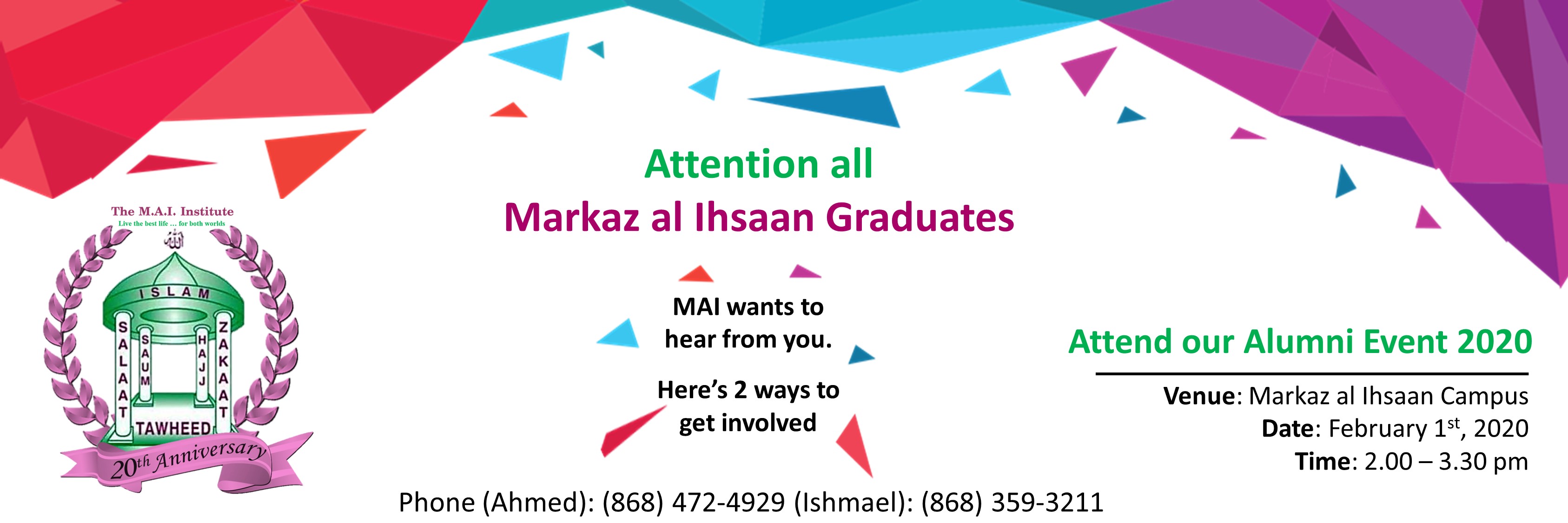
MAI Alumni Event 2020
An alumni association is a key part of any school, and is of growing importance in today’s environment of continuous learning and self-organised learning environments.
MAI is pleased to launch its MAI Alumni program with its first annual Alumni event scheduled for this January. Through this, it is hoped that past students would be able to realise key benefits, including:
- reunite with classmates
- expand networks by meeting other graduates
- keep abreast of school developments
- access new programs for continuous learning
- get involved in activities and take advantage of opportunities in and through the school
- assist present students in navigating their journey
The first annual MAI Alumni event is carded for
- Saturday, February 1st, 2020
- Markaz al Ihsaan Campus
- Starts promptly at 2.00 pm
Interested alumni can visit the Alumni webpage; email admin@maiinstitute.com; WhatsApp +1 (868) 488-0178 or join our WhatsApp Group here
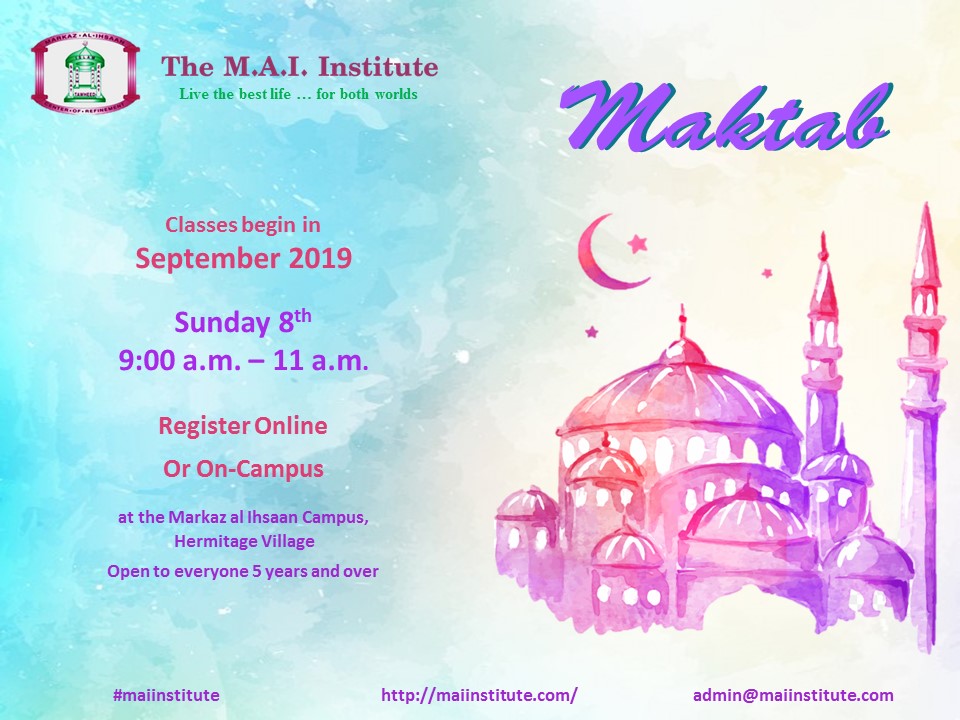
Children are our Future
The maktab program has completed its first year, and we have much more in store for them this year.
All are invited to register their children for weekly classes that teach our children Islamic values and practices, and provides a healthy environment for their mental and social development.
The maktab program commences on Sunday September 8th, from 9 am – 11 am. Registration is open and children can be registered online.
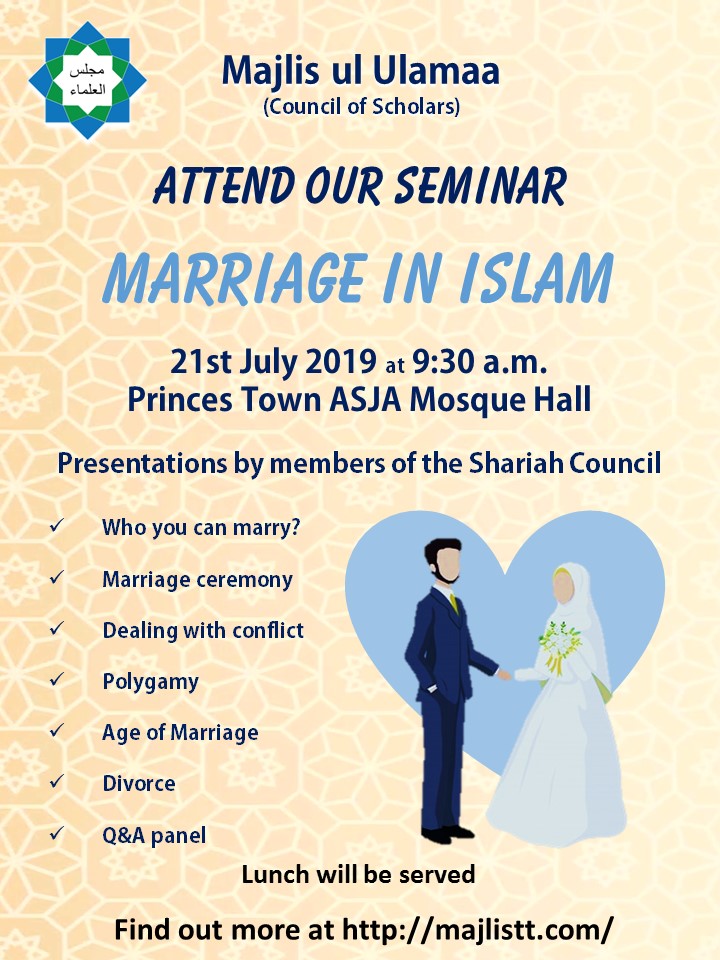
Marriage in Islam Seminar
Majlistt (http://majlistt.com) is pleased to invite you to its public seminar on the topic of ‘Marriage in Islam’
to be held at the Princes Town Asja Hall
Sunday July 21st, 9.30 – 12.30
Our Shariah Council members would be presenting on such topics as:
- Who you can marry and marriage to non-Muslims
- The age of marriage and the age of consent
- The Muslim marriage ceremony
- Roles, rights and responsibilities of the Husband and Wife
- Dealing with conflicts
- Polygamy
- Divorce
There will be a Question and Answer segment.
Lunch and refreshments will be served.
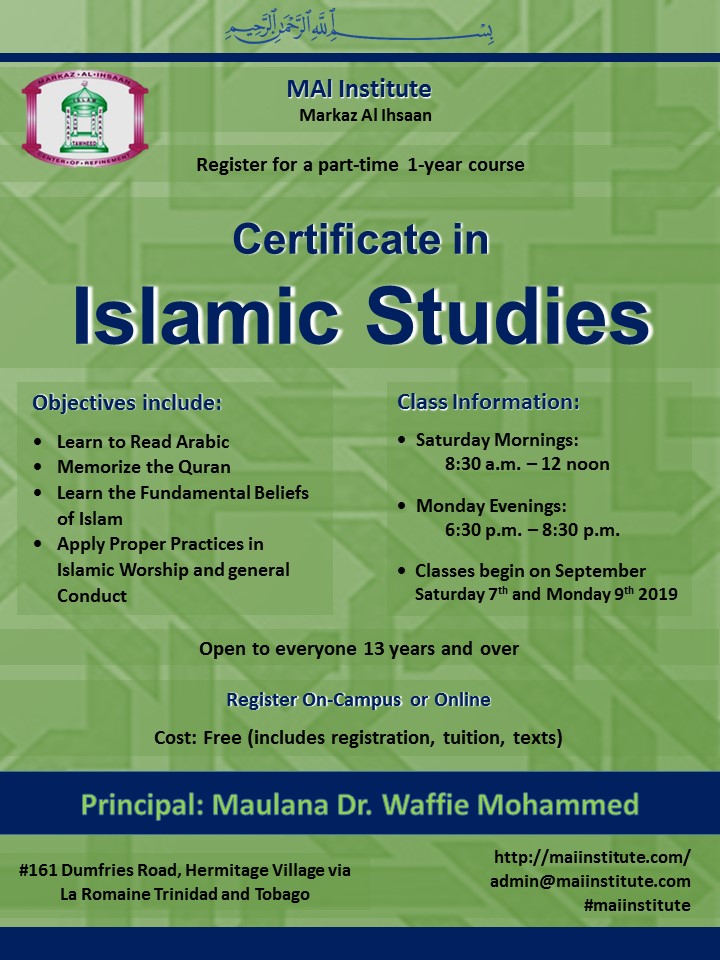
Certificate in Islamic Studies 2019 Intake
The MAI Institute is inviting all persons from 13 years and over to register for its Certificate in Islamic Studies programme in September.
This 1-year part-time course covers the essentials to know Islam and what is required to be a practicing Muslim, and you will learn:
- Learn the Fundamental Beliefs of Islam
- Apply proper practices in Islamic Worship and general conduct
- Learn to Read Arabic
- Memorize Chapters of the Quran
Classes are offered on the following:
- Saturday mornings 8.30 am – 12 noon
- Monday evenings 6.30 – 8.30 pm
Classes begin on the following:
- Saturday: September 7th
- Monday: September 9th
Persons interested can register at the following: